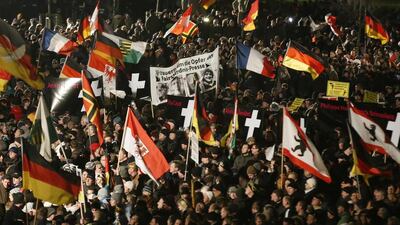Across Europe, the far-right is resurgent. Xenophobic, inward looking, suspicious of the ideas and people of the outside world: the political parties that wish to raise Europe’s drawbridge are once again making gains.
Old symbols have reappeared: the swastika in Germany, the totem of the European Union in Britain, the cry of “La Republique!” in France.
The differences, however, are surprisingly cosmetic. They are born of the same swamp of deprivation, the same fear of a changing order that has enriched only a few.
The language, however, has changed. The far-right used to worry about bloodlines. Now it fears “civilisational” collapse. Europe’s great fear of the Islamic empire at its gates has reappeared, only now it has turned its anger on its own minorities.
This language of “civilisation” has come from the top down. Watching Europe’s debate on free speech after the Charlie Hebdo attack was profoundly depressing, simply for the endless repetition of glittering generalities. Freedom of speech was elevated to a religious chant, despite the obvious – and, with the arrest in France of a comedian for writing a Facebook post, demonstrable – limits of free speech across the continent.
Yet such “civilisational” politics are central to Europe’s understanding of itself today. “This is a war declared on civilisation,” said Nicolas Sarkozy, who hopes to be the next French president. “This is an attack against freedom in general and the dignity of man,” said Angela Merkel.
The language of civilisation matters to European politicians – it is they who have promoted it and it is from them that the far-right has appropriated it. By cloaking itself in the respectable hand-me-down language of elected politicians, the far-right parties have managed to reinvent themselves on a continent that has grown tired of race.
In Germany, the manifesto of the anti-Islam movement Pegida makes no mention of race. Instead, it talks of Judeo-Christian civilisation – ironic, given the history of Germany’s far-right.
Civilisational narratives have filled a void once occupied by the Cold War narrative of freedom versus oppression and, after the collapse of the Soviet Union, prosperity and unity.
But the grand ideologies of the past have passed. Political parties in western Europe have been reduced to administering their states, no longer offering grand political visions.
Prosperity has stuttered and is at best unevenly distributed. The idea of unity too, is under threat, as the trajectory of ever closer union in the European Union halts and both Britain and Greece eyeball the exit.
Absent a strong rallying cry to group disparate communities together, politicians turned to “civilisation”, seeking to draw a distinction between the “light” of progress supposedly embodied by the rich former colonial powers, and the darkness of what lies outside.
What lies outside is always unsaid or merely hinted at, but the far-right has gleefully completed the sentences of the politicians.
Instead of explicitly using racial terms – Pakistani in Britain, Arab in France, African in Italy – they have grouped these together under the banner of “Islam”. With laws that defend against race-based hate speech, the far-right has gleefully spewed invective against one religion, confident that its supporters will understand the code word.
Commentators happily parse the distinction between a religion and a race, forgetting, wilfully or not, that the same distinction was once used to make respectable anti-Semitism, and that, for most of those most susceptible to Islamophobia, the distinction between an Indian Sikh and a Pakistani Muslim is irrelevant.
When a French man forced himself into Mohamed El Makouli’s house near Avignon last weekend, screaming about Islam and stabbed him 17 times, he did not pause to ask whether El Makouli was a Moroccan Christian, Jew, Muslim or, indeed, atheist. The hate was skin deep.
Civilisational politics, at its edges, merges a general fear of immigration and a much older fear of outside conquest. Crusaders and Christendom have returned as concepts, limited to the wilder fringes of politics and the internet for now, but claiming lives. When the Norwegian terrorist Anders Behring Breivik massacred 77 people on the island of Utoya, his manifesto explicitly claimed his attacks for “Christendom”.
Old Europe is beset by new challenges: the economy and immigration, a bureaucratic Brussels and a glowering Moscow. In the midst of an uncomfortable present and an uncertain future, new fears have found themselves wrapped in the comforting clothes of old.
falyafai@thenational.ae
On Twitter: @FaisalAlYafai


